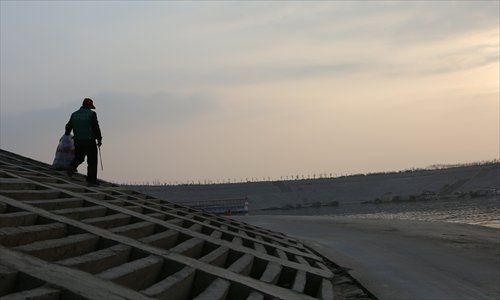HOME >> CHINA
Diversion eases water needs, but Beijing faces shortage
Source:Xinhua - Global Times Published: 2015-12-13 19:28:01

A sanitary worker collects garbage at the Danjiangkou Reservoir in Central China's Hubei Province on Thursday. Photo: CFP
Water diverted from the Yangtze River has helped ease Beijing's chronic water shortage over the past year, yet the city needs ever more water as well as greater conservation efforts to tackle the issue.Saturday marked the first anniversary of the start of the water diversion through the middle route of the massive south-to-north water diversion project.
The project is the largest of its kind at an estimated cost of 500 billion yuan ($77.5 billion). It was officially approved by the State Council, China's cabinet, in 2002, five decades after late Chairman Mao Zedong came up with the idea.
The first phase of the middle route is designed to eventually deliver an average of 9.5 billion cubic meters of water each year from the Danjiangkou Reservoir in Central China's Hubei Province to the northern provinces of Hebei and Henan as well as Beijing and Tianjin, benefiting some 100 million people.
In the first year, it diverted 2.22 billion cubic meters of water northward, and Beijing took 822 million cubic meters, or more than one third of the total, according to the administration bureau of the project's middle route.
The amount is expected to reach 880 million cubic meters by the end of this year, said Sun Guosheng, director of the project's Beijing office. The diverted water provides over 60 percent of Beijing's tap water supply.
Meanwhile, per capita water resources in the capital have surged from 100 cubic meters to 150 cubic meters, Sun said.
"The project has secured water resources for Beijing while protecting its underground water resources," Sun added.
Beijing previously relied heavily on underground water and the excessive exploitation led to decline of underground water levels and subsequent land subsidence in the past years. By the end of November, Beijing exploited 95 million cubic meters less underground water year on year, according to the Beijing Water Authority.
Meanwhile, authorities pumped some portion of the diverted water to several over-exploited local water sources to raise the underground water level and improve the ecosystem.
As a result, Beijing has seen a slower decline of underground water levels. The underground water level in October this year was 0.33 meters lower than last year while the level in October 2014 was 1.15 meters lower than the previous year.
The underground water must be compensated, or otherwise continuous excessive exploitation could lead to disaster, said E Jingping, director of the Office of the South-to-North Water Diversion Project Commission.
Treasure water
A dry climate and a large population have left Beijing with a severe water shortage. On average, it needs more than 3.6 billion cubic meters of water every year, but its own water resources only amount to 2.1 billion cubic meters a year.
Although the city's water shortage has been alleviated this year by the diversion project, it remains one of the main factors hindering the capital's sustainable development, said Sun.
Sun said Beijing will need more water from outside in the future as the population rises and city expands.
Xu Xinyi, head of the water research institute under Beijing Normal University, said the regions along the central route should boost their water conservation efforts.
Apart from conservation, the country should also adjust its industrial structure and limit water-consuming sectors, said Zhang Tong, deputy chief of the Beijing Institute of Water.
"As common citizens, we should treasure and conserve water," said Liu Liping, a doctor in Beijing, recalling the clean rivers of her childhood.
"Hundreds of thousands of people once living in the water source region have been relocated for the project. We should be grateful and never forget their sacrifice," she said.
Water resource experts said that diverting water from more water-rich southern regions will only alleviate Beijing's shortage temporarily, and that in the long run, the capital has to control its population growth as well as restructuring its economy.
Newspaper headline: A thirsty capital
Posted in: Society